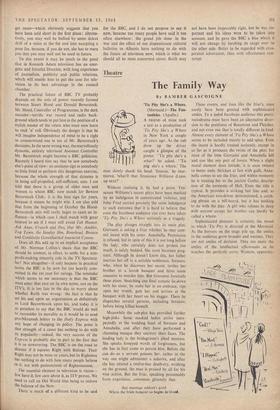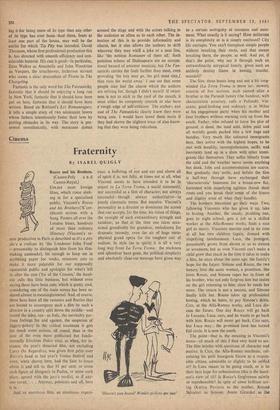Theatre
The Family Way
By BAMBER GASCOIGNE 'Tis Pity She's a Whore. (Mermaid.)—The Fan- tastieks. (Apollo.) A FRIEND of mine took a taxi to a production of (1(;\ 'Tis Pity She's a Whore Without realising it, he had a point. Ten- nessee Williams's recent plays have been marked by an indulgence in unmotivated violence, and • John Ford carried precisely the same indulgence to such extremes that it is hard to believe that even the Jacobean audience can ever have taken 'Tis Pity She's a Whore seriously as a tragedy.
The play plunges straight into its main plot. Giovanni is asking a friar whether he may com- mit incest with his sister, Annabella. Permission is refused, but in spite of this it is not long before the lady, who certainly does not protest too much, is safely bedded. She soon becomes preg- nant. Although he doesn't know this, her father marries her off to a suitable nobleman, Soranzo, who, when he discovers her secret, invites her brother to a lavish banquet and hires some assassins to murder him. But Giovanni forestalls these plans. Snatching one final ecstatic lie-down with his sister, he stabs her in an embrace, rips open her womb, guts her and 'arrives at the banquet with her heart on his dagger. There he dispatches several persons, including Soranzo, before being killed himself.
Meanwhile the sub-plot has provided further high-jinks. Some masked ladies arrive unex- pectedly at the wedding feast of Soranzo and Annabella, and after they have performed a charming masque they uncover their faces. The leading lady is the bridegroom's jilted mistress. She speaks honeyed words of forgiveness, but she has in fact come to poison him. Before she can do so a servant poisons her, rather in the way one might administer a sedative, and after she has uttered a twelve-line death-cry, writhing on the ground, the man is praised by all for his wise action. But the friar, speaking presumably from experience, comments gloomily that that marriage seldom's good Where the bride-banquet so begins in blood. These events, and lines like the friar's, must surely have been greeted with sophisticated smiles. To a jaded Jacobean audience this poetic melodrama must have been an alternative diver- sion to the prettiness of Beaumont and Fletcher, and not even one that is totally different in kind. Almost every element of 'Tis Pity She's a Whore seems to be included merely to add spice. Even .the incest is hardly treated seriously, except in so far as it produces the twists of the plot; for most of the time Giovanni and Annabella bill and coo like any pair .of lovers. When a slight moral element does intrude, it is soon twisted to better ends. Stricken at last with guilt, Anna- bella conies to see the friar, and within moments he is treating her to the juiciest Gothic descrip- tion of the torments of Hell. Even the title is typical. It provides a striking last line and, as the American taxi-driver demonstrated, a catch- ing phrase on a bill-board, but it has nothing to do with the play. A girl who refuses to sleep with anyone except her brother can hardly be called a whore.
Sophisticated pleasure is certainly the mood in which 'Tis Pity is directed at the Mermaid. As the horrors on the stage pile up, the smiles in the audience grow broader and warmer.. They are not smiles of derision. They are more the .smiles of the intellectual afficionado as he watches the perfectly corny Western, appreciat- jug it.for being more of its type than any other of its type has ever been. And these, from at least one part of the house, may well be the smiles for which 'Tis Pity was intended. David Thomson, whose first professional production this is, has directed with smooth efficiency and con- siderable humour. His cast is good—in particular, Zena Walker as Annabella and John Woodvine as Vasques, the treacherous, lecherous servant who seems a clear descendant of Florio in The Changeling.
Fantastic is the only word for The Fantasticks; fantastic that it should be enjoying a long run in New York, fantastic that it should have been put on here, fantastic that it should have been written. Based on Rostand's Les Romanesques, it tells a simple story of two adolescent lovers whose fathers intentionally foster their love by putting obstacles in its way. The story is pre- sented unrealistically,, with musicians dotted around the sfage and with the actors talking to the audience as often as to each other. The in- tention of this is to provide informality and charm, but it also allows the authors to drift wherever they may whiff a joke or a neat line, like 'the noblest Romanov of them all.' Such pointless echoes of Shakespeare are an occupa- tional hazard of amateur musicals, but The Fan- tasticks carries the fault further than most, even providing 'the boy may go, the girl must stay,/ thus runs the world away.' I can see that some people may feel the charm which the authors are striving for, though I didn't myself. If sweet- ness is not to stick in the roof of the mouth, it must either be completely smooth or else have a rough edge of self-criticism The authors and cast of The Fantasticks clearly knew they were being cute. I would have loved them more if they had shown the slightest trace of also know- ing that they were being ridiculous.



































 Previous page
Previous page